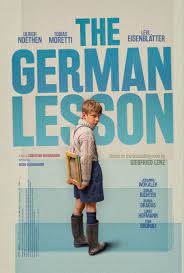
THE GERMAN LESSON
Germany, 2019, 125 minutes, Colour.
Ulrich Noethen, Tobias Moretti, Levi Eisenblatter, Tom Gronau, Johnna Wokalek, Sonja Richter, Maria Dragus, Louis Hofman.
Directed by Christian Schwochow.
The initial setting is 1943, World War II in Germany. However, the place is a north-west island of Germany, the North Sea, isolated, no visible Nazi insignia, the small community dominated by the local policeman, a rigid man in his interpretation of orders coming from Berlin.
The film is based on a well-known German novel by Siegfried Lenz. the film is to been directed by Christian Schwochow who, in recent years, has directed episodes of The Crown, adapted a Robert Harris novel, Munich, with Jeremy irons as Neville Chamberlain, and explored fanatical political stances amongst the young, Je Suis Karl. He has a very strong cast, led by Ulrich Noethen as the policeman, Tobias Moretti as a local artist who comes under government suspicion when art is deemed subversive, and a strong performance by a young actor, Levi Eisenblatter, as the policeman’s son, harshly dealt with by his father, and who has a fascination with the artist and art.
The film works very well as a portrait of a closed community, past bonds and friendships, past rivalries, but the constrictions of government edicts and the intrusion of the state on the artist as well as the consequences for the young boy and divided loyalties.
The story does move forward to the postwar period, the young boy has now grown up and is in juvenile detention, the consequences of some of his activities on behalf of the artist. He is humiliated, interned, confined to a cell. He is also been commanded to write his memoirs, especially focusing on the theme of Duty, something his father tried to instil in his son.
World War II stories continue to be of interest to a 21st-century public – and this is a different perspective on the war.
- The title? Symbolic?
- Germany, 1943, the coast and islands, the Northwest? The village, homes, the countryside? The contrast with the postwar period, the village, the same? The institution, interviews, tests, writing? The musical score?
- The opening, the focus on Siggi, age, the lesson, the significance of Duty? Siggi unable to write, the commander and his attitude, talking with city, commanding him to write, his being in the classroom? Going to his cell, stripped, examined, the effect on him?
- The flashbacks, the dramatising of his writing, sometimes returning to the classroom, but the gradual development of his relationship with his father, duty, his relationship with Max?
- The family, at home, Jens and his role as the policeman, his sense of duty, the letter of the law, the war situation, his responsibility, orders communicated, his fulfilling them? His relationship with his wife, his oldest son going to war, the daughter and her sense of rebellion, Siggi as the youngest, and his sister caring for him? The episodes of their being together, joy in each other’s company? At Max’s, getting drenched by the rain? Sigg and his father’s attitude, the punishment and the caning? His expectations of his son?
- Max, the friendship with the father since they were at school? The two wives and courting? Max as an artist, the visuals of his paintings, the themes? The authorities considering art degenerate, his art, its being confiscated? Max’s reactions? Siggi his reactions and concealing the paintings?
- The meal sequences, the two friends, Jens and his standing his ground, the tension at the meal?
- Siggi, his visits to Max, his father’s interrogations, Max teaching him to paint? Siggi confessing?
- His sister, her deciding to leave, the effect on Siggi?
- His brother, serving in the war, deserting, shooting himself in the arm, Siggi helping him, Max helping, his father discovering him, out in the dunes, the confrontation, his father’s denunciation?
- The authorities, coming to confiscate the paintings, the authority and his comments on painting, Max, the resignation, the reaction of his wife? Siggi and his reaction?
- Siggi taking the paintings, burying the paintings, returning, digging them up?
- After the war, everything returning to normal, the father resuming his role as police chief? His family?
- Siggi, his father’s attitude, his being in the institution, writing his memories, the sense of Duty – and his satchel with so many volumes of his memories?